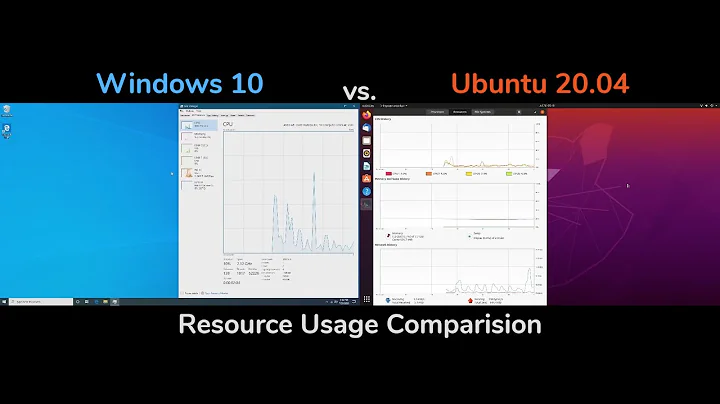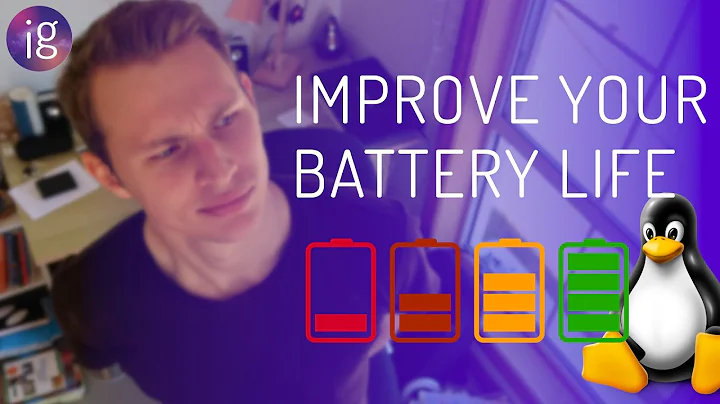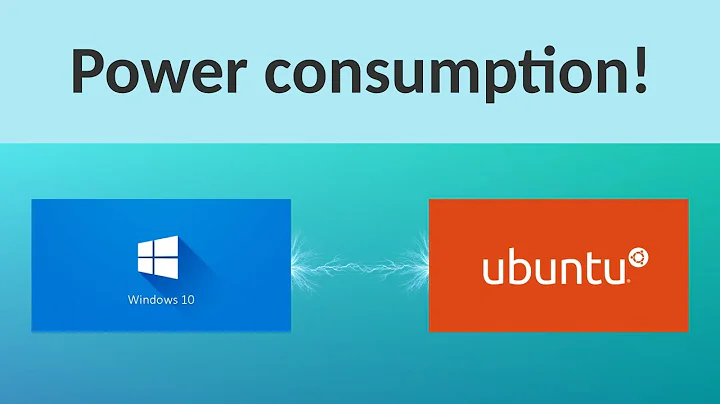Why does my computer get less battery life with Ubuntu compared to Windows?
Solution 1
There is a reasonably well known kernel issue with power management on PCI Express systems.
Try editing your boot-up grub entry to include pcie_aspm=force to the kernel parameters, and seeing if that improves your power consumption.
Solution 2
It's claimed that Windows 7 provides better battery life than Ubuntu, I haven't compared it on my laptops though. That said there are many approaches to increase it. Here are those I've found the most effective:
- Install package laptop-mode-tools. It switches your laptop to a "laptop mode" whenever it's on the battery, hard disks are spun down, power saving mode is turned on for peripherals/devices etc.
- Use task manager to find the most intensive processes and disable them (check PowerTOP as well). Also disable boot services you don't need (
apt-get install bum) and services started by your graphical window manager. - Check that your CPU frequency is scaled down dynamically (
cat /proc/cpuinfo). - Reduce screen brightness (display consumes the most power).
- Some random tips might help, i.e. see this answer.
Solution 3
For 13.04
There are quite a lot of myths about battery life. Essentially, what kills batteries on the long run is heat. What kills them on the short run are unnecessary services and processes. Windows is fairly good at limiting power use because a lot of collaboration with hardware vendors has gone into optimizing hardware power limitations.
You want to try and make sure your computer heats as little as possible when working on battery. On Ubuntu 13.04 you can use TLP. It has the following functions (non exhaustive list):
- Kernel laptop mode and dirty buffer timeouts;
- Processor frequency scaling including "turbo boost" / "turbo core";
- Power aware process scheduler for multi-core/hyper-threading;
- Hard disk advanced power management level and spin down timeout (per disk);
- SATA aggressive link power management (ALPM);
- PCI Express active state power management (PCIe ASPM) – Linux 2.6.35 and above;
- Runtime power management for PCI(e) bus devices – Linux 2.6.35 and above;
- Radeon KMS power management – Linux 2.6.35 and above, not fglrx;
- Wifi power saving mode – depending on kernel/driver;
- Power off optical drive in drive bay (on battery).
There is a full answer here explaining in great detail how to use and configure it. The answer here might also help you to make sure your (possibly tweaked) settings apply whenever you boot on battery.
As for the difference between windows and ubuntu, there are a few questions you should ask yourself:
- Do you have a power management tool installed? Something like TLP? Also did you configure it well? [Side note: a power management tool can also make sure you use all your horse power when needed. I have noticed considerable differences.]
- Are you running the same things on Windows and on Ubuntu? Is everything you run necessary (do you have an apache server running for a joomla or wordpress tutorial you once tried)? Sometimes people have a full development stack in Ubuntu and just some office apps in Windows.
- Are the measurements the same? Did you check whether Windows and Ubuntu actually gave you the promised time?
- How many processors do you use? Also when you boot?
- Are you using your GPU? This can make an enormous difference! If you have a Nvidia card with Optimus technology (essentially, this is a power saving option which your Windows machine will support out of the box) you should use bumblebee. By the way, its developpers are great people that help you on the spot in IRC.
- Are you using the same settings for the brightness of your screen?
The advantage of Ubuntu over and against Windows is that you could also choose another desktop manager (Unity is quite CPU intensive). Better configuration (even with unity) can allow you to double your battery life. Mileage may (and will) vary.
Solution 4
You may want to either upgrade to Precise (the development version that will become 12.04LTS when it's released in April), which seems to have improved battery lifetime on my computers. You can also install 10.04LTS and upgrade when 12.04LTS becomes available. 10.04LTS had far better battery life.
Solution 5
If you want to get the best out of your battery life you should go for a lightweight setup. Also kernel 3.2 is known to have bettered some of the regressions that happened in earlier kernels.
These are the kernel options I use:
pcie_aspm=force i915.i915_enable_rc6=1 acpi_osi=Linux acpi_backlight=vendor, the acpi_osi=Linux may or may not be relevant on your dell system.
i915_enable_rc6 enables sleep on idle for the cpu.
pcie_aspm was already explained.
Now to the low power setup. What you could do is take lxde or razor qt desktop environment or you do it as I do. Take some lightweight wm, and the components out of xfce that you need.
I'm up to 7 hours of battery time with my laptop when i turn off wifi.
Now on to laptop-mode. Make sure you have cpufreq installed, then in /etc/laptop-mode/conf.d/cpufreq.conf make sure the battery governor is powersave, BATT_CPU_GOVERNOR=powersave.
cpufreq-info tells you on which governor you are right now.
Related videos on Youtube
Comments
-
 Rajesh Pantula over 1 year
Rajesh Pantula over 1 yearLast year I purchased a Dell Inspiron 5315 laptop shipping with Windows 7 preinstalled. I installed Ubuntu 10.10 alongside it with dual-booting. On upgrading to Ubuntu 11.10, I was upset to find I now get less than one hour of battery life! Windows 7 gives me 2.5 hours of running time.
Is there any possible explanation why my battery is running out faster with Ubuntu? Can anybody tell me better power options?
-
 Qasim almost 11 yearspossible duplicate askubuntu.com/questions/285434/…
Qasim almost 11 yearspossible duplicate askubuntu.com/questions/285434/… -
 Rajesh Pantula almost 11 yearsHow can this post be duplicate, the other post you have shown was authored on April 25, while this post is from previous year.
Rajesh Pantula almost 11 yearsHow can this post be duplicate, the other post you have shown was authored on April 25, while this post is from previous year.
-
-
Bruno Pereira over 12 yearsNot sure if upgrading to currently alpha release distro is the best advice you can give a user without knowing his level of knowlege. This is rather dangerous and should be avoided (imho).
-
Jo-Erlend Schinstad over 12 yearsI normally would never do that, but things have changed with Precise. It's supposed to be usable all the way through the cycle, if I understand correctly. Except for a small inconvenience with the upgrade manager, I haven't had a single issue with it so far. But you're right. I did recommend installing 10.04 and upgrading when 12.04 is released.
-
 Uri Herrera over 12 yearsAlpha release nonetheless.
Uri Herrera over 12 yearsAlpha release nonetheless. -
Jo-Erlend Schinstad over 12 yearsSure, but not like earlier alpha versions. But again, I recommended 10.04, which is anything but alpha. The point I was trying to make, was that this isn't really about Ubuntu in general, but a special and temporary situation.
-
Bruno Pereira over 12 yearsSounds fair, +1.
-
Arnel A. Borja over 12 yearsIs this answer really correct? packages.ubuntu.com shows that Ubuntu Linux 10.10 (Maverick) have Linux kernel 2.6.35.31.40, while according to the Phoronix website, that power issue started in Linux kernel 2.6.38, and first found on a Ubuntu Linux 11.04 (Natty). See packages.ubuntu.com/maverick/linux and phoronix.com/…
-
jeshurun over 11 yearsWatch out for issues like the mouse cutting out when on battery when installing tools like
laptop-mode-tools -
 Shauna about 11 years@ArnelA.Borja - The OP mentioned that they noticed the issue in 11.10, so unless it was fixed between 11.04 and 11.10, it makes sense the issue is now occurring.
Shauna about 11 years@ArnelA.Borja - The OP mentioned that they noticed the issue in 11.10, so unless it was fixed between 11.04 and 11.10, it makes sense the issue is now occurring.




